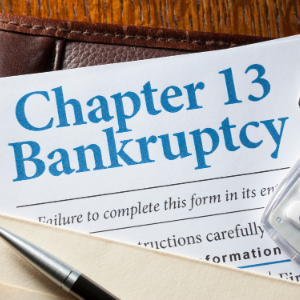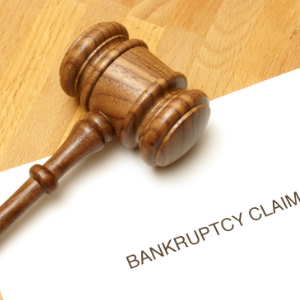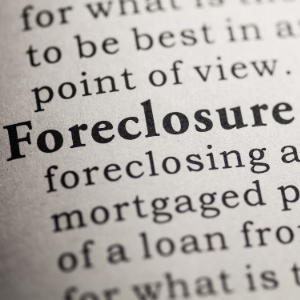
Understanding Bankruptcy Laws in North Carolina
A solid grasp of North Carolina’s bankruptcy law is necessary for homeowners who want to sell their house while their bankruptcy case is still open. Knowing the two primary flavors of bankruptcy—Chapter 7 and Chapter 13—is essential because each one shapes a property sale.

Under Chapter 7, a court-appointed trustee might liquidate non-exempt assets to pay back creditors, and that can include real estate if there is no shield around it. The state’s homestead exemption locks in up to $35,000 of equity, or $70,000 for married couples who own the home together.
Chapter 13, by contrast, lets homeowners keep their houses as long as they adhere to a court-approved repayment plan that reorganizes their debts. Selling a property during bankruptcy still requires court permission and must follow federal guidelines and North Carolina statutes.
Because the rules can get tricky, sound legal advice is essential to ensure the deal closes promptly.
If you’re looking to skip the stress of court filings, agent fees, and drawn-out showings, Zack Buys Houses buys houses as-is for cash in Charlotte, including the cities of Asheville and Gastonia, making it easier to move on from bankruptcy with less hassle.
Financial Strategies for Homeowners Facing Bankruptcy
Selling a house after filing for bankruptcy in North Carolina works best when you plan, clear your head, and run the numbers so you keep as much money as possible. Anyone thinking about bankruptcy should take a frank look at their finances before choosing the path that best suits them and their home.
One of the smartest moves you can make is to sit down with a North Carolina bankruptcy lawyer who knows the state’s rules. Such an expert can give you advice that fits your exact needs. At the same time, you should ask yourself if selling your house will ease your money troubles and let you hang onto as much of your hard-earned equity as possible.
Under Chapter 13, you may get to keep your home while you reorganize your bills, but Chapter 7 sometimes calls for auctioning it off. The North Carolina exemption list matters because it decides how much equity you can legally keep after any sale.
Teaming up with a real estate professional who regularly works with distressed properties can ensure your house is priced right, marketed well, and shown to buyers with the cash to close quickly. If you time the sale carefully in and out before the bankruptcy hearing, you may wipe out debts without dragging your family through a lengthy court fight.
Key Points to Discuss with Your Attorney Before Listing Your Home
Sit down with your lawyer before you put your house on the market after filing for bankruptcy in North Carolina. You want to be sure the sale follows the law and fits your best game plan. First, find out if you need court approval to go ahead. Chapter 7 and Chapter 13 cases each have their own rules, so this step matters.
Ask what selling the house could mean for your bankruptcy. Your lawyer will explain how the sale might change asset exemptions and how any cash is divided among creditors. They can also help you set a fair asking price that matches the current market and leaves room to pay off any liens or mortgages.
Taxes are another hot topic. Selling during bankruptcy could generate tax bills you didn’t expect, so talk it through. Your attorney will guide you through North Carolina’s timelines and forms, ensuring everything lands in the right office on the right day so your deal doesn’t stall.
By weighing all these points with your lawyer, you can confidently choose when to list your house and still manage the ups and downs of bankruptcy.
Legal Considerations When Selling Property in Bankruptcy

Knowing the rules about selling your home while in bankruptcy in North Carolina is essential. When you file, an automatic stay goes into effect; that stop sign stops most creditors from demanding payment immediately.
Selling your house during the case is different because the court still has to bless the deal. You usually submit a motion asking the stay to be lifted and show that the sale won’t short-change your creditors.
Money from the closing also becomes part of the bankruptcy estate and must be handled under federal and state rules. North Carolina lets you keep some of that equity through certain exemptions, but the limits change if you file Chapter 7 instead of Chapter 13.
These details matter a lot, since they decide how much cash you walk away with after the sale. To stay on the right side of the law, work with a real estate attorney who knows both real estate and bankruptcy in North Carolina.
Steps to Prepare Your House for Sale During Bankruptcy
When selling your house while in bankruptcy in North Carolina, you must follow a few steps to ensure a smooth transaction, first, review the law’s requirements and how the sale will affect your bankruptcy case with your bankruptcy lawyer and real estate professional.
You will also need written approval from the bankruptcy court before moving forward. This approval proves that you have met North Carolina’s legal rules. Once you have it, boost your curb appeal by fixing minor repairs, trimming the yard, and adding a fresh coat of paint if possible.
A neat, welcoming look helps buyers picture their lives in the space. Clearing out boxes, clothes, and extra furniture lets rooms feel bigger and brighter. With everything clean and staged, ask your professional for a fair price based on recent sales so the offer meets both market trends and your bankruptcy needs.
Be honest about your situation with purchasers. Clear, steady talk among buyers, creditors, lawyers, and experts keeps surprises away and makes the sale easier for everyone.
How to Determine the Value of Your Home in a Distressed Sale
If you must sell your house quickly during a bankruptcy in North Carolina, you want to ensure the price is fair. Start with a comparative market analysis. Look up homes that sold recently near you, note how yours differs, and use that data as a rough guide.
Remember that distressed sales often attract lower offers because buyers worry about speed and hidden problems. A local real estate expert who has handled these deals can explain what to expect and spot issues you might miss. Also, hire an appraiser familiar with bankruptcy sales; they will value the property based on its current condition and the latest trends, not wishful thinking.
Keep an eye on the state’s housing ups and downs because even a slight shift can add or wipe out thousands of dollars in value. In a soft market, weigh your home’s location, size, age, and unique features before setting an aggressive but still reachable asking price.
Navigating the Housing Market in North Carolina Amidst Bankruptcy
Selling a house in North Carolina while in bankruptcy is tricky, yet you can close the deal with the right team. First, take time to learn the rules, and then call a real estate lawyer who knows the state’s bankruptcy law inside and out.
You must get the court’s approval before you list or accept an offer, or you could run into legal trouble later. An expert who sells homes in your area can help you price fairly and market the property so it stands out even when finances are tight.
A solid appraisal will show buyers they are paying a fair amount and reassure creditors that they will get what they are owed. Minor repairs, fresh paint, and clean landscaping boost curb appeal and lead to faster, stronger offers.
Stay in close contact with your lawyer, professional, and lenders or trustees so everyone knows what happens at each step. Clear communication makes the process smoother and increases the odds that the court will approve the deal without unnecessary delays.
The Role of a Real Estate Professional in Selling a Bankrupt Home
Selling a house part of a bankruptcy case in North Carolina is not something to try alone. A good real estate professional brings the know-how and calm guidance you need when money is tight and time is short.
Because they work in the local market daily, professionals know how to set the right price so the home catches buyers before values drop. A seasoned professional will team up with you and your bankruptcy lawyer to file all the court paperwork and get the judge’s stamp on the sale.
If liens or other claims sit on the title, real estate professionals can bargain with creditors and keep showings on a schedule that works for you. Their exhaustive list of contacts lets them market the sale to investors and everyday buyers who already understand the special rules that come with a bankrupt property.
With their support, the sale moves faster, stays within the legal lines, and, most importantly, gives the homeowner one less thing to worry about during a tough time.
Common Mistakes to Avoid When Selling a House in Bankruptcy
North Carolina homeowners in bankruptcy often stumble because they do not grasp the court rules that govern the sale. Skipping the step of getting official court permission before listing the property can lead to big headaches and may even void the sale.
Another frequent pitfall is setting the wrong asking price, whether too high or too low, which scares away buyers or leaves money on the table. In addition, hiding or skimming over important bankruptcy details can make buyers suspicious and stall talks.
Some sellers skip hiring experts in distressed-property sales, from real estate experts to attorneys who know North Carolina’s unique laws. Rushing to pick the first offer while ignoring market trends usually leads to regret.
Finally, solid sellers keep their creditors informed and follow every court-mandated step rather than assuming everything will work itself out.
How to Communicate with Creditors During the Home Sale Process
When selling a house while in bankruptcy in North Carolina, you must talk honestly with your creditors, start by telling each lender that you plan to sell and describing how the sale fits into your bankruptcy plan.
Stay open by sharing key documents, such as the listing contract or a fresh appraisal, to show that selling is smart for everyone. Sending regular updates about offers or inspections builds trust and encourages creditors to cooperate.
Be ready to negotiate terms and ask the bankruptcy court for approval. A good bankruptcy lawyer can guide you through the legal steps and keep your lines of communication friendly.
Taking this proactive route reduces confusion and helps your sale close even when money is tight.
Exploring Alternatives: Short Sales and Foreclosures Explained

When selling your home while in bankruptcy in North Carolina, you should consider a short sale or foreclosure. A short sale lets you sell the house even though its sale price is lower than what you owe the bank, as long as the lender gives the green light.
Going this route can keep you out of foreclosure, which damages your credit score and makes future loans much more challenging. While in bankruptcy, knowing the difference between North Carolina’s judicial and non-judicial foreclosure paths is also smart.
Judicial foreclosures move through the court system, while non-judicial ones follow a faster, out-of-court route but still end with you losing the house. By working with the lender, a short sale can clear some of those harsher outcomes off the table.
Homeowners in North Carolina should weigh each option during bankruptcy and pick the one that best fits their finances and long-term goals.
Tax Implications of Selling Your Home During Bankruptcy Proceedings
Knowing how taxes work when selling your house in bankruptcy in North Carolina is essential. A key point is the capital-gains-tax break, which lets you keep up to $250,000 of profit tax-free if you file as single, or $500,000 if you file jointly with your spouse.
Of course, you must meet the ownership and use rules to claim that break. Also, if the lender cancels part of your mortgage because of the sale, the IRS may treat that forgiven debt as income, unless you qualify for one of its notable exceptions.
Remember, your bankruptcy trustee can use the sale proceeds to pay creditors. Because of the mix of real estate, tax, and bankruptcy rules, it is smart to talk with a North Carolina tax expert who knows all three areas so you stay within the law.
How to Stage Your Home for a Quick Sale Despite Financial Challenges
Even when money is tight, staging your home the right way can speed up a sale and boost the final price, even if you’re in bankruptcy in North Carolina. Start with a big declutter so each room feels roomy, calm, and inviting to buyers.
A coat of soft, neutral paint on the walls can make spaces look bigger and friendlier. Dont forget the outside; trim the lawn, tidy the entry, and add a few bright, potted flowers because first impressions count.
You can also save money by turning pieces around to spotlight the house’s best features and let buyers move comfortably from room to room. Everywhere, shiny windows, spotless counters, and spotless kitchens and baths show buyers you care.
Minor upgrades such as new light bulbs, fixtures, or cabinet handles deliver a fresh feel without emptying your wallet. If you use these easy, inexpensive moves, your house can stand out in a tough North Carolina market, even during a bankruptcy.
Understanding Buyer Behavior in Distressed Property Markets
To understand what buyers want in a troubled property market like a North Carolina bankruptcy sale, it’s key to see each group’s motives and worries. Most buyers here are bargain-hunting investors or people searching for homes priced far below the normal rate, and they want quick deals to move profits into the next deal.
Because these buyers know the seller is under bankruptcy stress, they use that knowledge to shape every line of their offer. They usually dig deep into due diligence, hunting for hidden land liens, easement problems, or other legal red flags that could drain time and cash later.
They also look closely at the home’s physical state, expecting a distressed house to need new roofs, pipes, or even fresh framing before it is livable. Knowing these worries lets sellers in a bankruptcy frame their marketing, set a price that feels fair to buyers, and sketch a timetable that won’t stretch into months.
Savvy sellers often team up with experts specializing in short sales and bankruptcy properties to speak the buyers’ language, answer questions fast, and close the sale for the best possible dollar.
The Importance of Accurate Disclosure When Selling Under Financial Duress
Giving precise, correct details is necessary when selling your house while in bankruptcy in North Carolina. Letting buyers know you are under financial stress protects you from legal trouble and makes the deal go smoother.
State law says sellers must point out any facts that could sway a buyer’s choice, and bankruptcy fits that rule. Buyers trust you more when you share the real story about the home’s finances, and talks move along faster.
Hide that information and risk lawsuits, angry buyers, or delays while the court reviews the sale. Being open lets everyone make smart decisions and helps you meet state rules and the bankruptcy court’s needs.
Honesty also builds your reputation and conforms to the basic ethical standards that good professionals expect, even when times are tough.
Negotiation Tips for Maximizing Value in a Bankrupt Home Sale
Selling a house after bankruptcy in North Carolina isn’t easy, but smart negotiating can raise the sale price. Start by learning the ins and outs of your local housing market. Knowing what similar homes sell for lets you set an appealing yet realistic list price that attracts buyers while still paying creditors their due.
Team up with a realtor who has handled bankruptcy sales before. Their know-how will guide you in crafting solid offers and sharp counteroffers. Keep talking during negotiations, highlighting upgrades, curb appeal, or other features that set your home apart.
Being honest about the bankruptcy story builds trust, especially when you sell the situation as a quick, hassle-free chance for buyers. Stay in touch with your lender or trustee so every contract meets legal timelines and gets the required sign-offs.
Stay flexible. Small perks like covering closing costs, tossing in a fridge, or letting the buyer pick the paint can seal a deal without gutting your profit.
Working with Lenders: Mortgage Payoff Strategies During Bankruptcy
Selling your house while in bankruptcy can get messy, so clear talks with your lender in North Carolina are key to hammering out ways to pay off the mortgage. Sometimes those talks lead to options like a short sale or a loan modification that fit your money situation.
Knowing the details of your loan and bankruptcy lets you negotiate better terms when the house is sold. Staying connected with your bankruptcy lawyer and real estate professional keeps the deal legal and tries to squeeze out the most cash for you.
Working as a team also helps settle late payments and untangle any liens, so everyone leaves the sale happier and the path to closing stays smooth.
Post-sale Steps: Rebuilding Financial Stability After Bankruptcy
Once the house is sold and the bankruptcy court nods, the focus shifts to patching your finances. Start with a simple budget that lists every dollar you earn and all the bills you still owe so you can steer your early money moves in the right direction.
Pay off your debts first. Set aside cash to pay any overdue bills. At the same time, build an emergency fund to cushion the next time money gets tight.
Check your credit report often to spot mistakes or big drops. A counselor or coach can help you read the numbers and steer your budget, making sure that when you decide where to save or invest, you do so.
After your North Carolina bankruptcy clears, habits like not overspending and setting long-term goals will slowly lift your score and move you toward lasting financial freedom.
Resources and Support Systems for North Carolina Homeowners Facing Bankruptcy
Selling a house after filing for bankruptcy in North Carolina can get messy fast, so you need the right people in your corner. Everyone in this situation should contact a bankruptcy lawyer who knows the state’s rules.
These attorneys can explain how to keep equity, deal with mortgage payments, and stay on the right side of federal and state laws. Financial coaches add another layer by showing you how to manage debt and prepare for a stable money future once the house is sold.
It’s also wise to call a local HUD-approved housing counselor. They can provide step-by-step help with loan talks and outline the options for foreclosure alternatives.
A real estate professional who handles troubled homes will market the property, guide you through court-approved sales, and even bargain with creditors if needed. Tapping into these resources can speed up sales and keep big-picture recovery goals in line with North Carolina bankruptcy rules.
How Do I Sell My Property in Bankruptcy?
Selling a house while you are in bankruptcy in North Carolina can feel tough, but it can be done with the right help. First, you must understand that once you file under Chapter 7 or Chapter 13, all your assets, including your home, join the bankruptcy estate, and a court-appointed trustee supervises.
You must get the judge’s blessing to proceed with the sale, usually by filing a motion to sell. That step proves the deal meets state and federal rules and shows how the money will be used to pay creditors.
Teaming up with a North Carolina bankruptcy lawyer who knows these cases is vital to meet every legal deadline. A real estate professional experienced in court-oversight sales can also price the property right and market it quickly.
Always be honest and follow the rules; trying to close a sale without court approval can backfire and hurt your case. If you stick to the steps and secure the required orders, you can sell your home while in bankruptcy and move on with your life.
How Much Home Equity Can I Keep When Filing Chapter 7 in North Carolina?

If you’re considering filing Chapter 7 in North Carolina, knowing how much equity you can keep in your house is key. The state’s homestead exemption protects up to $35,000 of equity in your primary residence, so you dont lose it during bankruptcy.
Filing jointly with your spouse? That limit jumps to $70,000. If your equity stays within these numbers, you could qualify for Chapter 7 and keep your home.
To calculate your equity, start with an honest market estimate of your house’s worth, then subtract the balance of all mortgages and liens. Knowing the exempt amount lets you decide whether selling or keeping the house is your best path while you wipe out debt.
Because these rules can get tricky, talking with a North Carolina bankruptcy lawyer early on can help protect your home and guide you through the Chapter 7 process.
How Soon Can I Sell My House After Filing for Bankruptcy?
Selling a home while still in bankruptcy is a tricky mix of legal steps and money matters, so you must tread carefully. If you plan to unload your house after bankruptcy, ensure you know the special rules and timelines that North Carolina sets.
As soon as you file, an automatic stay goes into effect, blocking most collection efforts, including any planned sale of your house. Even so, you can sell the house, so long as the bankruptcy judge gives the green light.
Typically, you first ask the bankruptcy trustee for permission and prove that the sale will not hurt the creditors you owe. The steps may differ depending on whether you choose Chapter 7 or Chapter 13.
In a Chapter 7 case, the trustee might liquidate assets to pay bills, so getting approval can be straightforward if your home has usable equity after the allowed exemptions. With Chapter 13, you are on a repayment plan, and selling the house could change how you pay your debts month by month.
To sell a house during bankruptcy, consult a local attorney familiar with the court system and North Carolina’s housing rules.
Do You Need a Lawyer to Sell a House in North Carolina?
Selling a house while you’re in bankruptcy can get complicated, and people in North Carolina often wonder if they need a lawyer. Although North Carolina law does not force you to hire an attorney for a home sale, having someone who knows real estate and bankruptcy can save you many headaches.
A good lawyer walks you through the state’s rules and the extra bankruptcy paperwork you must follow. They also double-check that every required disclosure is made and that the deal lines up with both state law and federal bankruptcy guidelines.
Your attorney can act as a go-between for creditors and the bankruptcy trustee, helping you craft terms that work in your favor. Their experience can spot trouble before it grows and give tips on pricing, repairs, and other moves that might boost your home’s value without breaking legal limits.
In short, paying for advice can speed up the sale, reduce stressful surprises, and give you peace of mind when needed.
If you’re in bankruptcy and need to sell fast, Zack Buys Houses buys houses as-is for cash in Charlotte. Skip repairs, showings, and delays—we make the process simple so you can move on with less stress. Contact us at (704) 769-0141 today to get your offer.
Helpful North Carolina Blog Articles
- Selling Your Investment Property in North Carolina
- Selling Your North Carolina Home With An Existing Mortgage
- How To Successfully Sell A House With Tenants In North Carolina
- Appraisal Repairs in NC: How They Impact Your Home Sale
- Documents Required to Sell a House in North Carolina
- Closing Costs Without a Realtor in North Carolina
- Guide To Filing A Quitclaim Deed For Real Estate In North Carolina
- Real Estate Division In North Carolina Divorce Cases
- Selling Your North Carolina Home Without A Real Estate Agent
- Who Pays the HOA Fees at Closing in North Carolina
- How to Sell a Condemned House in North Carolina
- How to Sell a House As-Is in North Carolina
- Does a Seller Pay Closing Costs in North Carolina
- Can You Sell a House That Failed Inspection in North Carolina

| DEBTOR | BANKRUPTCY PETITION | BANKRUPTCY BASICS | CHAPTERS 7 | U.S.C. | BANKRUPTCY FILING |
| BANKRUPTCY DISCHARGE | DISCHARGE IN BANKRUPTCY | DISCHARGE | CAR LOANS | SURCHARGE | FEE |
| LAWYER | THE UNITED STATES | UNITED STATES | CASH | PAYMENTS | UNSECURED |
| UNSECURED DEBT | TAXES | CHAPTER 11 | MAINTENANCE | ALIMONY | UNSECURED CREDITORS |
| REALTOR | PETITION | MONEY | PRIVACY | CONSUMER | |
| CHILD | UNDUE HARDSHIP | TERMS OF USE | PHONE | SECURED DEBT | SECURED CREDITOR |
| REPOSSESSED | REPOSSESSION | THE INTERNET | INTERNET | FREQUENCY | FRAUD |
| EMAIL ADDRESS | DATA | CRIMES | COPYRIGHT | CONSENT | CONFIDENTIAL INFORMATION |
| COLLATERAL | CHILD SUPPORT | IN CHAPTER 13 |
